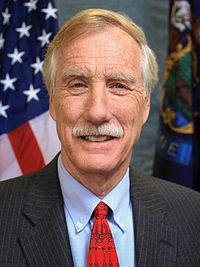
How we can better meet our commitment to veterans
By U.S. Sen. Angus King, I-Maine
There’s an old saying that one day of seeing is worth a thousand days of reading. I’ve always found that there’s simply no substitute for first-hand experience. So, when the Secretary of Veterans Affairs Denis McDonough asked how he could better serve Maine veterans, I told him – come see for yourself. In early August the secretary took me up on the offer and joined me on a tour of the state. Together, we met with veterans, VA staff, and community leaders to hear how the federal government can better meet our commitment to the brave men and women who served our nation.
Our trip started in Rumford at the town’s brand-new VA community-based outpatient clinic. Across the country, CBOCs provide critical healthcare services for veterans in rural communities. One of the most important services the clinics provide is screening and treatment for veterans that were exposed to toxins – like burn pits or Agent Orange – during their service.

Addressing these health challenges from toxic exposure is a huge issue for veterans across the country. That’s why Congress came together last year to pass the bipartisan PACT Act, ensuring that veterans can get the toxic exposure care and benefits they deserve. As the secretary saw in Rumford, CBOCs can be the first touch point in this effort. In fact, since the PACT Act became law, we’ve seen a significant increase in both new veterans coming to the VA and getting healthcare for the first time, as well as veterans already in the system being screened for toxic exposures — up to around 4 million or so veterans screened nationally. It’s an incredible accomplishment, but there is still more to be done.
In Rumford, and during our next stops at Togus and the Portland CBOC, it was clear that one of the biggest hurdles to providing PACT Act benefits is staffing. The VA simply needs more staff to handle the claims in a timely, efficient manner. The secretary heard this message loud and clear– and I’m hopeful we can work together in Washington to address the issue.
Another area where the clinics are making progress is in helping veterans treat conditions in need of limited term residential care, including but not limited to, post-traumatic stress disorder. During our visit, we saw a new approved plan to build a standalone residential building at Togus for veterans needing this kind of care. It will take some time to complete, but I am glad to work with the secretary and the Maine VA on programs like this that will benefit our veterans well into the future.
Following our tours of the healthcare clinics, the secretary and I participated in a roundtable discussion on housing challenges and homelessness among our veteran community. In Maine today, there are roughly 200 veterans experiencing homelessness. This is a pretty significant increase to what we saw before the COVID-19 pandemic and it’s largely due to the increase in rental prices and supply of housing drying up, creating competition for the few available units that exist.
This challenge is not unique to Maine. Affordable housing is a nationwide crisis and it’s the reason why we have to work together — across government agencies and with the private sector — to come up with solutions to house our veterans. At the roundtable with the secretary, A goal was set of housing 100 homeless veterans by Veterans Day in November and we’ve already seen good progress. Led by the staff at Preble Street in Portland who are working with landlords to provide housing specifically for veterans, so far, at least 30 units have been offered. There are still some logistical challenges, but this is an important step in a larger goal to functionally end veteran homelessness in Maine by the end of 2025.
As the secretary and I saw while traveling the state, there are real challenges facing our veteran communities, but none are too large to tackle if we work together. With continued partnership with the VA, private organizations, and my fellow veterans committee members in Washington, I truly believe we can meet America’s commitment to the men and women who served our nation.
It was a very full visit; in fact, the only downside was that I’m afraid we may have worked the secretary too hard — and I’ll have to do some persuading to get him back!
If you have been exposed to burn pits or other toxins during service, please call my office or the VA at 207-623-8411 to learn more.